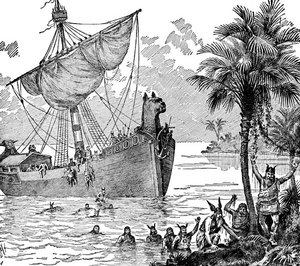The epics of Norse mythology, filled with the tales of ancient gods and Viking heroes, are one of the major windows we have on the society and religion of the ancient Scandinavians. In the heathen mythology (referred to as Asatru by modern day practitioners) there was a great war between the two races of gods; the Aesir (whose famous members include the thunder god Thor, the All Father Odin and the trickster god Loki among others) and the Vanir. At the end of the war, to help maintain peace, the two groups exchanged hostages (a technique that was also favored by the Celts, and which was a favored tactic of the famous Irish king Niall of the 9 Hosts) to ensure that there would be no further malice. Njord was sent from the Vanir to the Aesir, and he came with his two children Frey, the god of nature and prosperity, and Freya, the goddess of love, battle, death and magic.
Though not as famous as his two offspring, Njord was a very important figure to the pagan Vikings. First and foremost he was a god of sailing, which was one of the major crafts and professions among the Norsemen. Njord was also a master of witchcraft, as were all the Vanir, and he brought luck and good fortune to his worshippers. He was particularly regarded among coastal villages, where the fertility of the land was attributed to its proximity to the sea, being Njord’s realm.
Njord in particular, and the Vanir more broadly, are also unique in Norse mythology in that incest was allowed and even condoned among them. This helps to represent the wilder nature of the Vanir, and their lack of civilization. Typically a god would marry a giant, or one of the other tribes of gods, and such pairings lead to children the Thor’s sons Modi and Magni, Odin’s son Vidar and many of the younger generations of the Aesir. Frey and Freya were the product of Njord and his sister, and though it’s hinted at that the gods of beauty and breeding had carnal knowledge of one another, such behavior was not tolerated once they’d come to live among the Aesir and each married; Frey to his wife Grid and Freya to Hermod or Odur, depending on the version of the myth you read. Even Njord married the frost giantess Skadi, though many myths say they divorced because she could not bear the sea, and he could not bear the mountains that were her home.
Aside from being the father of two important deities, a high priest in his own right and the overseer of one of the North’s most important activities, Njord isn’t mentioned in many prominent myths. The death of Baldur doesn’t refer to the Vanir god, and though his son has a destiny at Ragnarok (the Norse Armageddon where the giants, Loki and his children the goddess Hel, the Fenris Wolf and the Midgard Serpent Jormundgand), Njord’s fate is left unmentioned. Though it’s assumed that unless it states otherwise, all the gods die in the last battle with survivors being the exception rather than the rule.
“Njord,” by Michael Lindemans at Pantheon
“Njord,” by Anonymous at Knowledge Rush
“A Wisdom Archive on Njord,” by Anonymous at Experience Festival
